Harrow International School Beijing
Harrow International School Beijing (simplified Chinese: 北京哈罗英国学校; traditional Chinese: 北京哈羅英國學校; pinyin: Běijīng Hāluó Yīngguó Xuéxiào "Beijing Harrow English School"[2]) is a private school located in Chaoyang District, Beijing.
| Harrow International School Beijing | |
|---|---|
| Location | |
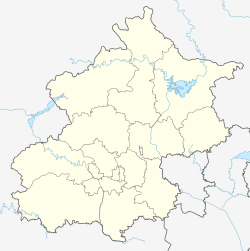 Harrow International School Beijing 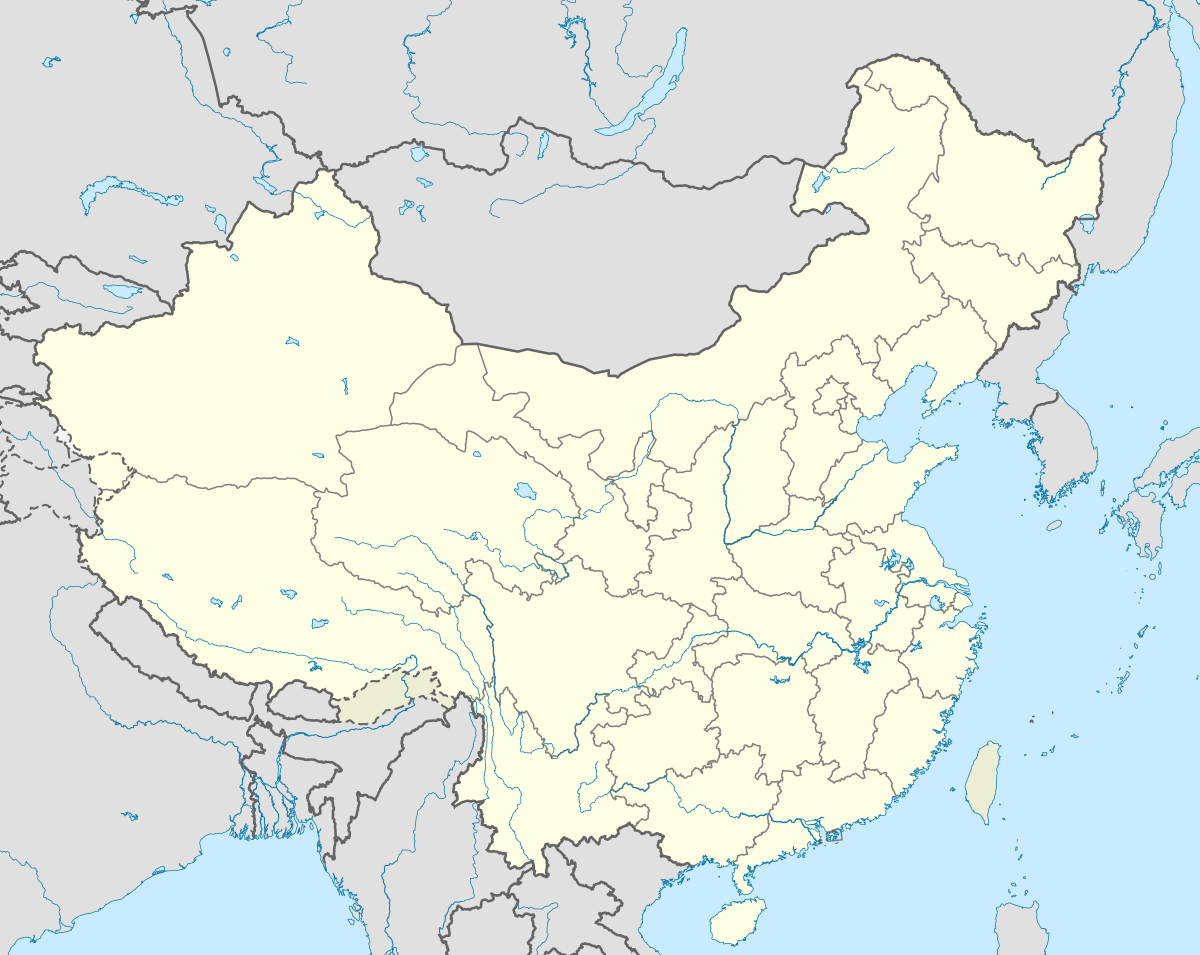 Harrow International School Beijing | |
Beijing, China [1] | |
| Coordinates | 40°02′12″N 116°29′58″E |
| Information | |
| School type | Independent, international, day school |
| Motto | Stet Fortuna Domus (Latin: "Let the fortune of the house stand") |
| Established | 2005 |
| Headmaster | David Shinkfield |
| Colour(s) | Blue, gold |
| Website | harrowbeijing |
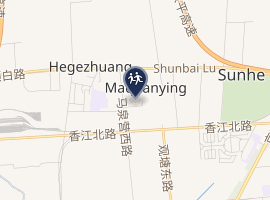
| |
It was established and gained its license to operate in China in 2005 in association with Harrow School (London, UK) and Harrow International School, Bangkok. The school currently has over 1000 students, both boys and girls, representing 38 different nationalities, ranging from 3 to 18 years of age. The school follows and enriches the National Curriculum of England, Wales and Northern Ireland. The majority of teaching staff are recruited from the United Kingdom. The founding headmaster was Mr Matthew Benjamin Farthing. Recruited as part of the Senior Management Team that established Harrow International School in Bangkok in 1997, he had special responsibility to oversee the developing curriculum and ensure that academic standards were maintained.
Harrow Beijing is a coeducational day school that initially taught pupils from age 11, unlike its namesake in the United Kingdom, which only teaches boys, is a boarding school, and begins instruction when its students are 13.[3] Jehangir S. Pocha of The New York Times said that Harrow, which uses English as its instructional language, has "a wider approach to education" than traditional Chinese schools and it is one of several private schools that is attractive to Chinese parents who have "means who are looking to turn their children into global citizens".[4]
History
Harrow Beijing opened in 2005. It was the second British-style public school to open in China, after Dulwich College, which had opened a branch in Shanghai in 2004 and a branch in Beijing in 2005. It was the second international Harrow school to open, after Harrow International School, Bangkok. As of 2 December 2006 Harrow Beijing had 150 students.[3] Matthew Benjamin Farthing, the headmaster, said in 2006 that during the school's first year, most of the children were expatriates. These included those from the United Kingdom and what he described as "countries familiar with the value of a Harrow education".[4] That year he said "but in two years I expect things will be different".[4]
Affiliations
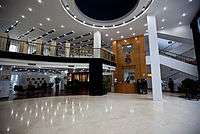
Harrow International School Beijing is operated by a private company, Harrow Asia Limited. Harrow Asia Limited also operates Harrow International School, Bangkok.
Both schools operate under a license granted by Harrow School in London. Close ties exist between the schools, with teacher and pupil exchanges, interviews held at Harrow School, and day-to-day co-operation between staff. Harrow International School Beijing shares governors with Harrow School and they regularly visit the school.
In 2006, Harrow International School gained accreditation from the Council of International Schools (CIS).[5] Harrow International School Beijing is also a member of the Federation of British International Schools in South East Asia and East Asia (FOBISSEA).[6] Harrow International School Beijing is fully accredited by all the British Examinations Authorities including Edexcel, CIE, AQA and OCR.
Operations and structure
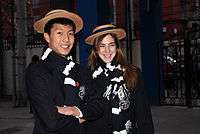
Harrow International School Beijing is divided into four phases of progression:
The Pre-Prep Phase includes students from Early Years (age 3) to Year 5 (age 8–9). Pre-Prep follows a form based curriculum with specialist teaching in Mandarin, PE, music and art.
The Preparatory Phase includes students from Year 6 (age 9–10) to Year 8 (age 11–12). The teaching within this phase of the school increases subjects taught by specialist teachers until every subject is taught this way.
Senior School comprises students from Year 9 (age 12–13) to Year 11 (age 15–16). Students within this phase continue to take every subject until Year 10 when they focus on those they are taking for their GCSEs in Year 11.
Sixth Form comprises the two oldest year groups (age 17–18) in the school. Sixth formers study for the GCE 'A’ Levels . Since 2005 every student graduating the Sixth Form has gone to university. In 2010 46% of students achieved A* or A grade at 'A’ Level.
In 2015 the tuition for the year was 200,000 renminbi ($32,220 U.S. dollars). China Daily ranked Harrow Beijing as the 7th most expensive private school in Beijing.[7]
Houses
The house system was introduced in 2008, and is modelled on the Houses of Harrow School. There are six houses at Harrow International School Beijing, consisting of three boy houses and three girl houses (opposite-sex relatives can choose to join the house of their relative):
- Churchill (yellow) – Boy house, named after Winston Churchill, British Prime Minister, Old Harrovian
- Curie (green) – Girl house, named after Marie Curie, Nobel Prize winning chemist and physicist
- Ju Ching Chu (red) – Girl house, named after the mother of Daniel Chiu, founder of Harrow International School Beijing
- Kong Zi (blue) – Boy house, named after Confucius (Kong Zi), Chinese philosopher
- John Lyon (orange) – Boy house, named after John Lyon, founder of Harrow schools
- Song Qing Ling (purple) – Girl house, named after Soong Ching-ling, Madame Sun Yat-sen
Each house is led by a teacher called the Head of House. All students from Pre-School (age 3) to the Upper Sixth (age 18) are enrolled in the houses. The houses compete in a number of competitions and activities held throughout the year to win house trophies. The houses are very involved in local community and charity work and this has been their main focus.
Each house has one representative in each year group, elected by the students in the year group. They help the house captains to arrange activities and lead the houses. The house events turn leadership into actions and help the students to develop various skills.[8]
Campus
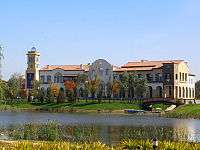
The school is located in Hegezhuang Village, Cuigezhuang Township, Chaoyang District, Beijing, China. It is located halfway between Shunyi and Downtown Beijing.[9]
Before April 2013, the school was split between two campuses. The old Lower School was based in Grassetown, Tongzhou,[10] located in the countryside around Shunyi, Beijing. The Preparatory Phase occupied a separate building on the Lower School campus.
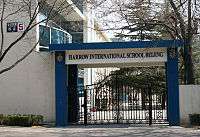
The old Upper School was located in Anzhen Xili, near the Beijing Olympic Stadium.[10] It occupied the site of a former Chinese primary school in Chaoyang District, central Beijing. It had been extensively refurbished and extended to provide a modern learning environment.
In April 2013 the school moved to a new, purpose-built, combined (Lower School and Upper School) campus in Hegezhuang, Chaoyang District.
Curriculum
The curriculum of Harrow in Beijing is based on the National Curriculum for England and Wales.[4] Students study A-Levels, GCSE, and other British qualifications.[11]
Demographics
Students include expatriates and Chinese nationals.[11]
Extra-curricular activities
Harrow has an enrichment activity system which allows students to pick their last class from Monday to Thursday.[4]
See also
- Harrow School, in the UK
- Harrow International School, Bangkok, in Thailand
References
- campus location?
- "国际学校库 – 北京哈罗英国学校." Sina. Retrieved on 20 June 2013.
- Spencer, Richard. "Slow boater to China." The Telegraph. 2 December 2006. Retrieved on 21 June 2013.
- Pocha, Jehangir S. "In China, a Western-style education has appeal – Asia – Pacific – International Herald Tribune." The New York Times. Sunday 15 October 2006. Retrieved on 21 June 2013.
- Council of International Schools (CIS)
- FOBISSEA The Federation of British International Schools in South and East Asia
- Sun, Chengdong (12 June 2015). "No 7 Harrow International School Beijing". China Daily USA. Retrieved 25 May 2017.
- http://www.harrowbeijing.cn/SchoolLifeSchoolHouses.aspx Archived 17 February 2015 at the Wayback Machine retrieved 29 April 2013
- "Contact Us Archived 12 March 2015 at the Wayback Machine." Harrow International School Beijing. Retrieved on 20 June 2013. "HARROW International School Beijing No.287 Hegezhuang Village, Cuigezhuang County, Chaoyang District, Beijing, China 100102 北京市朝阳区崔各庄乡何各庄村287号, 邮编: 100102" – Map Archived 3 March 2016 at the Wayback Machine
- Friedman, Ellis. "Harrow Unveils New Campus." Beijing Kids. True Run Media. Thursday 18 April 2013. Retrieved on 21 June 2013.
- Henry, Julie. "Boom time for British schools abroad." The Telegraph. 11 October 2008. Retrieved on 12 October 2013.